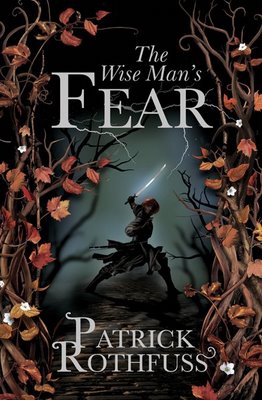
The Dragonmount Fantasy Review
The Kingkiller Chronicles by Patrick Rothfuss
I get asked a lot what books I’d suggest Wheel of Time fans read whilst they’re awaiting A Memory of Light, to such an extent that I thought it might be fun for everyone is we had a regular review of other fantasy novels on the site, fantasy novels which hold something similar to the spirit of Mr Jordan's work--be that in terms of scope, style, themes or whatever. With that in mind I thought that a monthly WoT-oriented look at some of the other shining stars of fantasy could be worth some time.
This month's entry will be on the Kingkiller Chronicles by Patrick Rothfuss. The first book, entitled The Name of the Wind, was released in 2007 and the second book, The Wise Man's Fear, was released worldwide on the first of March 2011.
What are the Kingkiller Chronicles About?
The Kingkiller Chronicles tell the story of a man named Kvothe. Or, perhaps more accurately, tell the story of a man named Kvothe telling the story of a boy named Kvothe. It begins with a historian seeking out the older Kvothe to get from him the true story of his infamous youth, which Kvothe finally agrees to. From there, over the next three days (each day at the inn being one of the books in the trilogy) Kvothe tells the historian his story. And what does that story cover? I'll let Kvothe tell you himself...
My name is Kvothe, pronounced nearly the same as "quothe." Names are important as they tell you a great deal about a person. I've had more names than anyone has a right to. The Adem call me Maedre. Which, depending on how it's spoken, can mean The Flame, The Thunder, or The Broken Tree.
"The Flame" is obvious if you've ever seen me. I have red hair, bright. If I had been born a couple of hundred years ago I would probably have been burned as a demon. I keep it short but it's unruly. When left to its own devices, it sticks up and makes me look as if I have been set afire.
"The Thunder" I attribute to a strong baritone and a great deal of stage training at an early age.
I've never thought of "The Broken Tree" as very significant. Although in retrospect, I suppose it could be considered at least partially prophetic.
My first mentor called me E'lir because I was clever and I knew it. My first real lover called me Dulator because she liked the sound of it. I have been called Shadicar, Lightfinger, and Six-String. I have been called Kvothe the Bloodless, Kvothe the Arcane, and Kvothe Kingkiller. I have earned those names. Bought and paid for them.
But I was brought up as Kvothe. My father once told me it meant "to know."
I have, of course, been called many other things. Most of them uncouth, although very few were unearned.
I have stolen princesses back from sleeping barrow kings. I burned down the town of Trebon. I have spent the night with Felurian and left with both my sanity and my life. I was expelled from the University at a younger age than most people are allowed in. I tread paths by moonlight that others fear to speak of during day. I have talked to Gods, loved women, and written songs that make the minstrels weep.
You may have heard of me.
These stories are themselves compelling, but in many ways it is in Rothfuss' skill as a writer, combined with the fact that Kvothe himself is not the most reliable narrator, that the true value of this book comes forth. Kvothe tells the story he wants to tell, and Rothfuss has him tell it beautifully. And, mixed between, interludes in which we get tantalizing glimpses of the modern Kvothe, and see both how the stories inform the man that comes to be--and at times more intriguingly, how they don't.
Why Do I Think This Would Appeal To WoT Fans
The Story; A Tale of a Boy That Grows Into a Wizard-Warrior
Whilst Jordan's story has been around long enough to set the archetypes these days, it doesn't do to forget that he told something original, something which had not been done before. Taking the classical story of the provincial young boy thrown out into the world at the whims of evil powers to learn to be a fantastical hero and leader in the war--only Rand's magic was not wondrous so much as scary, his role was not heroic so much as it was hopeful that when he was done destroying things, something might be left. His sword in the stone was flawed, his wise magical helpers were self-involved and childish, and he was--as heroes go--given a rather shoddy lot of it.
Rothfuss also takes the archetypal image of the hero, and plays with it. Through the stories of Kvothe's achievements an image is built, and then through the sardonic storytelling of the elder Kvothe that image is cut down again and again. Kvothe the Bloodless, to proud to bleed. Kvothe the Arcane calling lightning from the sky--if you have expectations on what should happen, they won't. And the few times they do, Kvothe Elder quite disdainfully refuses to tell the story.
Indeed, Rothfuss not only plays on what you want to see, but on what you don't. There were several times I found myself thinking 'ok, come on Rothfuss, we get it--Kvothe is cool' then reading the next chapter and practically feeling Rothfuss giving me a little slap on the face and saying 'come on man, you didn't think I'd be that obvious, did you?'
So what are the differences, and the downsides? Difficult question, as everyone appreciates stories differently. I will note, for instance, that people often complain about the abruptness of Jordan's climaxes. Battles built across books occurring in a smattering of pages. With that in mind, the WoT Fan should be warned--Kingkillers is definitely a story that is sold in the telling. The style of Rothfuss' writing (portrayed in the first person narration of Kvothe) is engaging, but also bound to Kvothe's inner nature. Thus, Kvothe is far more interested in telling the story of his fascination with a puzzle in a book, or the day spent trying to track down his girl, than he is in depicting his glorious and epic victories.
In effect, if you're looking for epic battles, you won't find them. That's not the story that's being told here, and if you're like me, that's fine. Something is being built, slowly and carefully--the juxtaposition between Kvothe Younger and Kvothe Elder is enough to show that, and for that I am content to wait, and enjoy the journey.
The World, A Home Fit For A King
Worldbuilding was one of Jordan's great skills--the scope and size of the Wheel of Time is something that many fans cite as being the element that draws them back to the Wheel time and again. Now Rothfuss only has two books out, so it’s impossible to compare to a twelve book series, but I will say this, based on the world he has shown so far, I do think Rothfuss has worldbuilding skillz. With a Z.
The Adem, for instance, a military society every bit as rich as the Aiel, with customs and language quirks that are amongst the most interesting things I've read in fantasy in a great long time. I'll leave you to discover those for yourself, however, and end with this note: his world is expansive, and his skill in showing us that world is, if anything, growing.
One other parallel I would draw is this--Patrick likes to use songs and stories to tell the history of the world. A tool Jordan also uses from time to time, though not as heavily--and like Jordan, he uses it to mess with the reader. The same story can be told in different places with different endings or the same endings told in stories with different players, and from this a picture of the past, confused and fuzzed, begins to emerge, tantalizing us with the depth of the world.
It's hardly a technique unique to either of them--but it's one I like, so you'll just have to live with me telling you about it. :D
Mr Rothfuss Brings New Life to a Style Tolkien Created and Jordan Revolutionised. Or Something.
Ok, so yes--that title is a bit wanky. Sounds like it came off a dustjacket of a b-grade book--or at least that was what I was hoping for. But I'm sure there is a rule somewhere that says all new fantasy authors have to be compared to Tolkien in a review, and I'm not one to break the rules--besides, there is a point I wanted to make, and that is this--it's all about the magic.
As a lead in to making this point, I would direct you to a blog entry Brandon Sanderson wrote on the subject of magic systems which he calls Sanderson's First Law. It rather excellently covers the various types of magic systems in fantasy stories, and the roles they subsequently play in the telling of the story. It's a worthwhile read.
But for simplicity here, let’s say there are two types. Hard Magic, which has its own set of clearly defined rules which are shown to the reader. I may be biased, but I've always regarded Jordan as the best Hard Magicist (Hard Magi?) about. The One Power with all its (post tSR) clearly defined rules and limitations is the perfect Hard Magic system, to my incredibly loyal mind. Tolkien's soft magic system, on the other hand, is beautiful. It's mysterious, invoking in us a sense of wonder that is not often felt in this modern world of hard science. The days in which maps ended with marks saying 'Here Be Dragons' are past, but they have an appeal which lingers, and are explored in the fantasy genre.
And here's the thing, Rothfuss does both, and well. Between the clearly defined sympathy, which Kvothe studies like a science, to the mysterious weaving of moonlight that is a gesture of magic from the Faen, to the Naming of Names which hangs between (or perhaps below, propping it all up) Rothfuss depicts a world which has both the intellectually intriguing element of hard magic with the sense of wonder that we so often feel at the prospect of anything fae and unknown in soft magic.
So should we put 'the love child of Jordan and Tolkien' on the dustjacket? I think so, if just for the spluttering that would result. But irrespective I'm sure you all take my point--others do hard magic. Other's do soft. Rothfuss has done something that is new--for me, at the least. He's dabbled in both, and it works well. Very well.
Production Times; A Cautionary Tale
Ok. So did you notice at the beginning that I said The Name of the Wind was published in 2007, and The Wise Man's Fear in 2011. Yeah... Rothfuss takes his time. The thing is, so did Jordan. And, though I worry about the parallels, so does Martin. And what I notice about all three is that they all produce really good books.
There is a sense of polish to The Wise Man's Fear, a sense that each word, however innocuous, adds to the insights of the world, the characters--or even just adds to the smooth flow of the writing itself, a thing that is subtle but which shouldn't be underestimated in terms of its value. If that takes time to produce (and I believe there is quote somewhere saying Jordan usually did somewhere between 8 and 11 drafts per novel) then so be it.
I brought this up because I know a lot of you find the wait between new books annoying. Not so for me--tell me an author takes his time, and I'll come to the table full of wide-eyed excitement. But that's me, and I can be somewhat odd.
General Thoughts and Conclusions
Rothfuss' storytelling is engaging and interesting. Though it is not what you would picture as a standard Epic Fantasy series, it is nonetheless deeply engaging. He uses many older techniques that I have not seen in some time--a story within a story, the switchback between first person and third person prose, the impact of a narrator’s personality on the portrayal of the story--and thus the inherent truthfulness of the narration itself--but he uses them all in a fresh, new way which in effect rejuvenates them.
I think the Kingkiller Chronicles will appeal to anyone who enjoyed the scope of the Wheel of Time. Rothfuss is most certainly not Jordan 2.0, but rather, like Jordan has begun something new, and all of his own, and it gladdens me that even as the Wheel ends, new Fantasy epics are rising to keep the genre alive and well.
Check out Patrick's official website
Hope you enjoyed all that. This is the first time out, so feel free to leave feedback on what you liked and didn't like.












Recommended Comments
Join the conversation
You can post now and register later. If you have an account, sign in now to post with your account.
Note: Your post will require moderator approval before it will be visible.